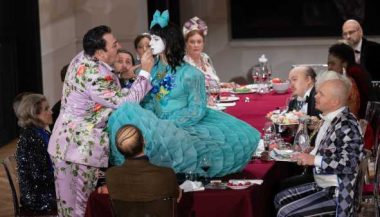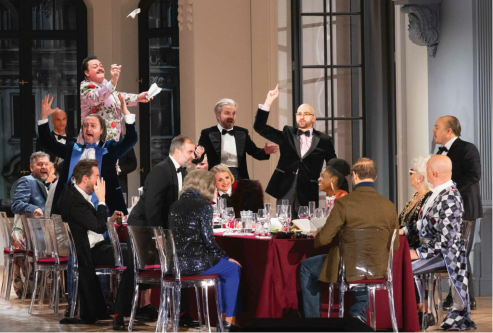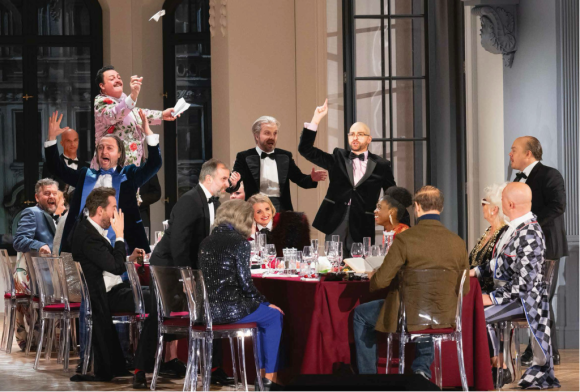 Germany Richard Strauss, Salome: Soloists, Philharmonisches Staatsorchester Hamburg / Kent Nagano (conductor). Recorded live (directed by Andy Sommer) at the Staatsoper Hamburg on 29.11.2023 and available until 27.4.2024 on ARTE Concert. (JPr)
Germany Richard Strauss, Salome: Soloists, Philharmonisches Staatsorchester Hamburg / Kent Nagano (conductor). Recorded live (directed by Andy Sommer) at the Staatsoper Hamburg on 29.11.2023 and available until 27.4.2024 on ARTE Concert. (JPr)

Oscar Wilde wrote the original play, Salomé, in 1891 in French, and it premiered in Paris in 1896. Richard Strauss saw it in Germany at Berlin’s Neues Theater in 1903 in Max Reinhardt’s production and the first performance of his one act music drama (as he called it) Salome was at the Royal Opera House in Dresden in 1905. The familiar tale tells us the Biblical story of Salome, step-daughter of the tetrarch Herod Antipas, who, to her step-father’s dismay – but delight of her mother Herodias – asks for the head of the captured Jokanaan (John the Baptist) on a silver platter as reward for her ‘Dance of the Seven Veils’, and in revenge for Jokanaan refusing to yield to her advances.
Dmitri Tcherniakov concentrates on Salome as the by-product of the moral ills of a hedonistic society. This moral lassitude, personified by Herod and Herodias, is responsible for Salome’s evident psychotic persona. Clearly, she is a victim of abuse and her own insatiable passions whether real or imaginary. When the ‘prophet’ Jokanaan rejects this young girl it triggers her descent to madness and death. So far so good though it looked to me as if Tcherniakov had no idea how to stage this with any sense of realism and no amount of dramaturgy can explain away what we see. It looks as if Tcherniakov got together with his team to suggest ‘What do you think we can get away with this time?’ and all credit to a strong cast who were willing to go along with him.
The curtain rises on ‘Herod’s Birthday’ celebration in a rich man’s salon with its plain walls and display cabinets with sculptured heads (!). The point in history is indeterminate though from the costumes – with a hint of fancy dress – it seems more modern than ancient, particularly with the Perspex chairs. Herod wears a garishly pink, floral-patterned suit, and when Salome enters she has a white puffer jacket covering a black Ren & Stimpy T-shirt (suggesting we are post the 1990s), gold skirt and trainers; with the nearly ever-present (yes!), balding Jokanaan wearing glasses, a roll neck sweater, brown jacket and jeans. We are meant to appreciate he is an intellectual and the honoured guest at this birthday dinner. Jokanaan is spouting his prophesises and other words of wisdom from the red-covered book he is reading – at the end of the table with his back to the audience – and these are applauded by all the diners. There is certainly a hint of Sigmund Freud about Jokanaan and perhaps he is quoting some of his new theories of psychoanalysis. Herod seems transfixed by what he hears from him and venerates Jokanaan as something of a new age guru.
Salome’s delusions about who is infatuated by her and who she is infatuated with is a symptom of her erotomania. Salome hugs Herod and allows him to touch her breasts and she will attempt to seduce the white-suited Narraboth across the table. He becomes so frustrated by Salome’s predatory behaviour towards Jokanaan – and desire to kiss him – that while we believe we know he kills himself, Tcherniakov has Narraboth exiting then returning to stand and sit before being walked out. When Jokanaan rejects Salome and curses her she is so frustrated that she takes it out on the table decorations.
Herodias – looking regal with a diadem – brings on suitcases. Is she suggesting Salome should leave? However, it seems they have some costumes in them for her to change into before entertaining the guests. Her face is now made up white and she has red lipstick. When everybody takes their seats around the table again we see how quickly opera productions can be overtaken by events. Five bickering jews start a theological argument about the fate of the prisoner, Jokanaan, which Herod attempts to deflect by firing paper aeroplanes at them, and our minds go immediately to the horrific scenes of the ongoing Israel-Gaza conflict.

It is no good suggesting Tcherniakov has any ideas whatsoever for Salome’s ‘Dance of the Seven Veils’ for Herod, who appears increasingly manic himself. She does some jiggling, some standing stock still, strips to her underwear, retires to a niche in one of the cabinets before being retrieved by Herod. He puts long white stockings on Salome and she is now in a lime-green (carnival?) creation and parades down the table – with some added ribbon dancing – as if it is a catwalk and she is just a sexual plaything to be gawped at for the guests’ amusement.
As her reward the libretto, of course, has her demanding Jokanaan’s head on a silver charger. Perhaps initially thinking it was a joke, as later Jokanaan will do when he laughs it off, the increasingly desperate Herod offers her the world – well at least jewels and white peacocks – not to go through with it, though Salome is adamant. Of course, there will be no beheading and for the most part Jokanaan remains quietly seated, even when we hear his supposed execution. Salome and Jokanaan wrestle again before he simply gathers his book and belongings and walks out of the room. It’s probably all been in Salome’s mind and Herod and Herodias are looking on as he calls for her to be killed at which point she convulses and collapses to the floor.
There is nothing very charismatic about Kyle Ketelsen’s Jokanaan, just as no doubt Tcherniakov demanded, but at least he does not need to intone as if at the bottom of a subterranean prison. Ketelsen sang with sonorous bass-baritone tones and was oddly conversational for this character.
Once again it became clear that the opera should really have been called Herod, as so strongly did John Daszak sing this role that in times past was often cast with a character tenor or heldentenor whose better days were behind him. Daszak took risks with his voice which – at least through loudspeakers – did not always come off and he will probably sing it better another time though it was a gripping portrayal. Violeta Urmana was an imperious presence as Herodias, with the elegant tenor voice of Oleksiy Palchykov making much of the short but very important role of Narraboth and the rest of cast shining in the scraps of music Strauss allots them.
It looks as if Asmik Grigorian cannot do anything wrong these days and she does not disappoint as Salome portraying what Tcherniakov asks of her convincingly. Grigorian sang the challenging and wide-ranging role with radiance, stamina, unflagging vehemence and potent sexual desire.
Kent Nagano at his curtain call did not seem to be everyone’s favourite but it sounded to me as there was an almost-ideal rhapsodic intensity to his account. There is no question he was well supported by the orchestra, so much so that the symphonic-like accompaniment would have been worth listening to even without the voices. Nagano brought out all the shimmering, quasi-Wagnerian colours in Strauss’s score whose innate late-Romanticism is often at odds with the unpleasant story and Tcherniakov’s ‘the king’s new clothes’ production … the king being Herod of course!
Jim Pritchard
Production:
Director and Set design – Dmitri Tcherniakov
Costume designer – Elena Zaytseva
Lighting designer – Gleb Filshtinsky
Dramaturgy – Tatiana Werestchagina
Cast:
Salome – Asmik Grigorian
Herod – John Daszak
Herodias – Violeta Urmana
Jokanaan – Kyle Ketelsen
Page – Jana Kurucová
Narraboth – Oleksiy Palchykov
First Jew – James Kryshak
Second Jew – Florian Panzieri
Third Jew – Daniel Kluge
Fourth Jew – Andrew Dickinson
Fifth Jew – Hubert Kowalczyk
First Nazarene – Alexander Roslavets
Second Nazarene – Nicholas Mogg
First Soldier – David Minseok Kang
Second Soldier – Karl Huml
